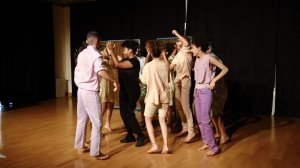As told to Eleanor Jacob, Seenaryo’s Communications & Engagement Manager.
Lebanon: Living in Darkness
Lama Amine is Seenaryo’s Head of Arts in Lebanon. She has directed a number of Seenaryo productions including Tilka and I see my ghost coming from afar, which toured twice to Germany. Lama is also a performer, choreographer, teacher and activist.
After the Beirut explosion on 4th August 2020, I decided I would always leave Lebanon for the anniversary. This is the first year I haven’t left. I believe I can face this anniversary with less fear, but I’m still angry. I’m angry with the government because after all this time we still don’t know the truth about what happened. Lebanon has been in darkness for the last three years – we have hardly any electricity and the economic collapse means people are really struggling. My neighbour has four children, two of them have disabilities, and she doesn’t have a generator so has to rely on the two hours of state electricity that we get a day.
A lot of money came to the country in the aftermath of the explosion. However, as soon as the war began in Ukraine all of the global media attention shifted, and the money went with it. Lebanon hosts around 1.5 million Syrian refugees, yet everybody seems to have forgotten about them along with the hundreds of thousands of Palestinians who also live in this country.
It’s the first time I’ve seen theatre with children where they address problems like they are adults.
When we made theatre with children before the explosion, they would create plays about kings, queens and animals. Nowadays, things are different. Seenaryo did a project this summer in partnership with the Beirut Art Center and the children really wanted to talk about their problems. Their play opened with a number of questions, they asked: “Why do people suffer? Why do people get cancer? Why are some people born poor?” They were asking all these questions about what is happening in Lebanon and what is happening in the world. It’s the first time I’ve seen theatre with children where they address problems like they are adults.

Since the Black Lives Matter movement, people in Lebanon have become less afraid to raise their voices and speak out. As a black Lebanese woman, I know all too well that Lebanon is a racist place. It’s not just about the colour of your skin, but it’s also about your nationality and where you’re from. There is this mentality of looking down on others. The Lebanese look down on Syrians, and Syrians look down on Sri Lankans for example.
BLM made people question themselves and ask why they treat some people differently. A number of recent Seenaryo productions have addressed the issue of racism: Tilka, I see my ghost coming from afar and Nashr Ghasil, to name a few. The participants want to speak about racism and while they are aware of the consequences they could face, they are no longer afraid to speak the truth – and to say it loudly.
Living through the explosion and then the earthquake has given people in Lebanon this constant feeling of instability.
On 6th February 2023, I woke up at 3am to find the whole house shaking for 40 seconds. Living through the explosion and then the earthquake has given people in Lebanon this constant feeling of instability. It’s taken away our trust. You start doubting your own thoughts, feelings and expectations. Those 40 seconds transformed the way we think about life. It makes you really appreciate being alive, whilst also making it very hard to think about the future beyond today.
We’re about to start a series of theatre workshops with young Syrian refugees in the Bekaa Valley, close to the Syrian border, whose families have been affected by the earthquake. For many of them the earthquake awoke a trauma that had been lying dormant for years. The workshops will create a space for these young people to address their fears and articulate their feelings about what has happened, and I hope that this will help them to begin imagining a brighter future.
